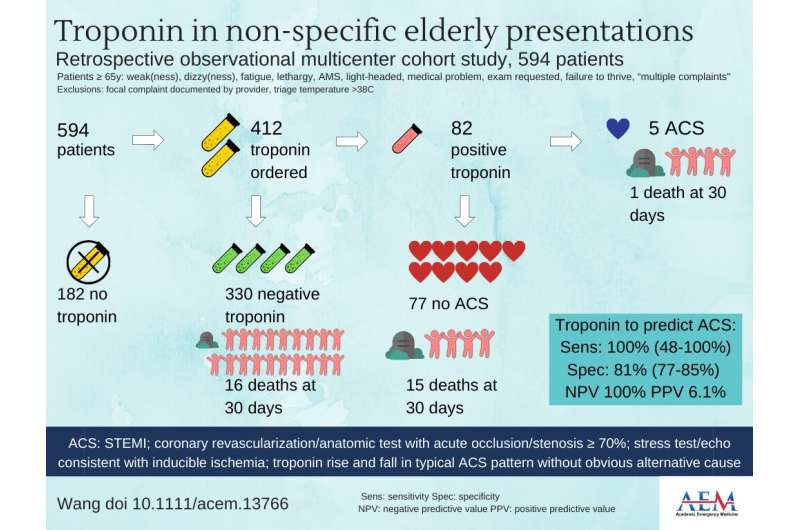Study questions routine troponin testing for ACS in geriatric patients with NSCs

The results of a study conducted by researchers from Indiana University School of Medicine may not support troponin testing for acute coronary syndrome (ACS) in selected elderly patients with nonspecific complaints (NCSs). The study findings will be published in the January 2020 issue of Academic Emergency Medicine (AEM), a journal of the Society for Academic Emergency Medicine (SAEM).
The lead author of the retrospective observational multicenter cohort study is Alfred Z. Wang, MD, assistant professor of clinical emergency medicine, Indiana University School of Medicine.
Wang et al. found that while consideration for ACS is prudent in selected elderly patients with NSCs, ACS was rare. In the series of elderly patients presenting to the ED with nonspecific complaints, most patients underwent troponin testing, and although 20 percent of those tested had an elevated troponin, the diagnostic yield for ACS was low. Only 1.2 percent of patients (6.0 percent of those with elevated troponin) were determined to have ACS. Further, only one patient underwent angiography, and no patients received reperfusion therapy; nonetheless, emergency physicians admitted everyone with an elevated troponin. Give the false-positive rate in the study, the authors suggest that the study results may not support routine troponin testing for ACS in geriatric patients.
While previous work has found that elderly patients, especially those patients older than 75, with ACS can present with nonspecific complaints, this is the first study to define the rate of ACS and evaluate the utility of troponin testing in elderly patients with nonspecific complaints. The study provides an estimate of the rate of ACS given nonspecific complaints, providing a previously unknown baseline risk estimate or pretest probability in this population.
Commenting on the study is W. Frank Peacock, MD, professor and vice chair for research, Henry JN Taub Department of Emergency Medicine, Baylor College of Medicine, Houston, Texas, and president of Comprehensive Research Associates:
"This study calls into question the routine practice of troponin testing in every single elderly patient with non-specific but potentially concerning symptoms. They report a false positive ACS rate exceeding 90 percent, which makes it hard to think that troponin testing was useful in most of their patients. But pointedly, some of their patient's died and the lack of a helpful troponin doesn't mean they shouldn't be admitted."
More information: Alfred Z. Wang et al, Troponin Testing and Coronary Syndrome in Geriatric Patients With Nonspecific Complaints: Are We Overtesting?, Academic Emergency Medicine (2019). DOI: 10.1111/acem.13766


















